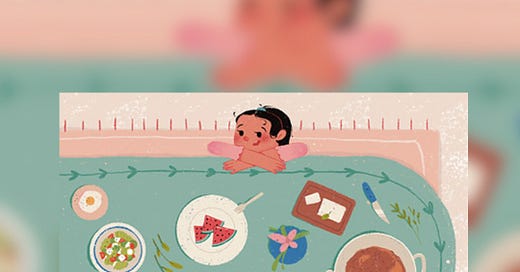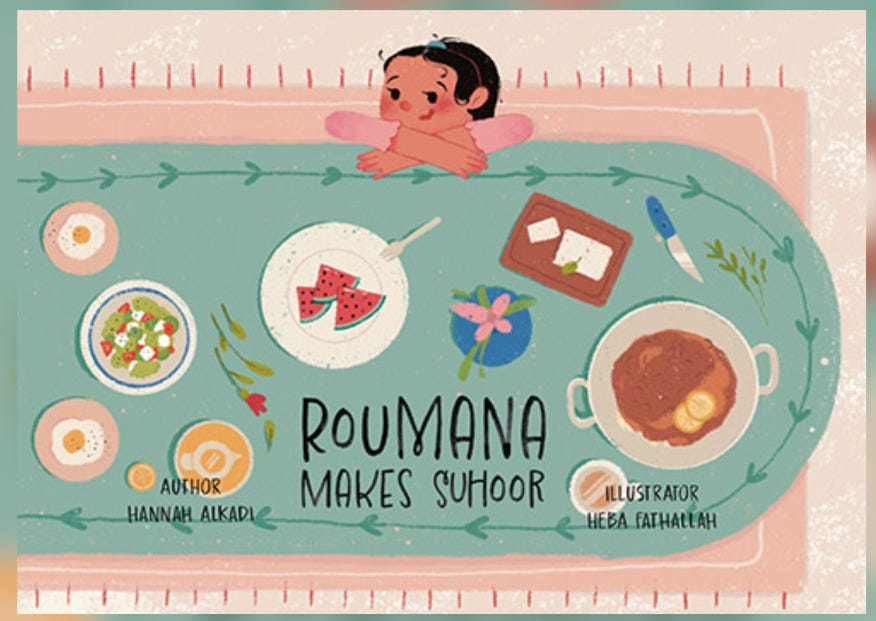In Conversation with: Hannah Alkadi, author of Roumana Makes Suhoor
You might not ever make a legacy. But you did it because you thought it was the right thing, and that even one person could benefit.
Hello and assalamu alaykum,
I hope you are all well and still finding time to write. This month’s interview features Hannah Alkadi, author of Roumana Makes Suhoor. It’s a heartwarming story filled with humor and Islamic values, perfect for young children learning about the blessings of Ramadan. I hope you gain valuable insights from this conversation to aid you on your writing path.
Bio:
Hannah Alkadi is a well-rounded, sharp-witted, and open-hearted writer with experience in agencies, nonprofits, multimedia platforms, and personal brands. She works hard with wordplay to inspire people to act—whether it’s learning more about a mission, contributing to a cause, or being a part of a community.
Name: Hannah Alkadi
Book title: Roumana Makes Suhoor
Genre: Kidlit (for now!)
Where do you get inspiration from?
Everywhere. My Pinterest board, nonfiction books, and conversations I have with others. My notes app is full of quotes from people and ideas that have popped up in walks. If I’m always looking for it, it’ll find me!
Have you always known you were going to be a writer? When did it become a dream for you?
At first, it was a hobby. A way to escape the world. As I got more into school, I lost my passion for it. It was homework. It was tedium. Like reading.
But as I entered a career in social media, my yearning for the long form came back. I was tired of the corruption and censorship behind pretty pictures. The subjectivity of what made something “viral.” I started reading and writing fiction and nonfiction, and adored finding myself in getting lost with words. It was the Ramadan of 2023. Here I am, in Ramadan of 2025, having published my first children’s book and at least 50 online publications! Alhamdulillah!
How did the idea for your book come about?
The short story: I was hungry.
The long story: You know how food calls out to you when you’re hungry? I’d gone out to a masjid that offered breakfast and a halaqah, and was delighted to see a lot of food from my own heritage—hummus, labneh (yogurt), and mana’eesh (flatbread). I started toying with the idea of a girl talking to the food as it was talking to her, and Roumana Makes Suhoor was born! Like a Muslim VeggieTales, almost.
What’s your favourite part about the writing process?
Drafting. Just sitting down and getting everything down. Brainstorming is often like a tornado for me; I have so many ideas whirling that finally setting them free is cathartic!
What was the most difficult part of the writing process for you?
Editing. I’m an enneagram 1, which means I tend to be a bit of a perfectionist. It’s hard for me to keep reviewing something, and especially rereading my writing in my voice… it feels like hearing nails on a chalkboard. But I’m getting better about accepting this as part of the process.
What’s the best writing advice you’ve ever received?
“Write.”
It can just be what you’re feeling that day—a poem in reflection, a one-off short story, a letter to Allah ﷻ. Don’t be beholden to a project if you don’t have a deadline for it, or if you’ve lost motivation. But don’t stop writing!
How long did it take to get from idea to publication?
A few years! Roumana Makes Suhoor was originally a poem I wrote in 2023. It wasn’t until Ramadan 2024 that I started submitting it to other places. I think I submitted it to five total. I’m grateful that Little Hibba worked quickly, and when I’d set a deadline of Ramadan 2025, they met it with full marks!
What was your biggest learning during the publishing process?
Do more research on what other books in your genre have done! Looking back, I might’ve incorporated a few recipes in the back matter, author’s notes, and even a glossary. A children’s book is a perfect place to incorporate these things, as adults are often the ones reading them.
If you could share one piece of advice with an aspiring writer, what would it be?
Read more. Be your library’s best friend (if you don’t have a card, the time is now to get one!) Download apps like Storygraph, Hoopla, Libby, and CloudLibrary. Follow more bookish accounts for recommendations. You’ll get more inspiration, obtain market research, and find your brain rewired to think like a writer.
What do you hope readers would get out of your book?
I think the biggest lesson of the book is that Allah ﷻ rewards us for our intentions. It’s something I hope I got out of writing the book as well. If you’ve been through the writing and publishing process, you know it’s kind of a gamble. You’re not in it to make money. You might not ever make a legacy. But you did it because you thought it was the right thing, and that even one person could benefit. That’s how I’m trying to frame it!
If there were no publishing barriers, what would your next book be on?
A reimagining of Susan Pevensie finding faith again—but specifically, as a Muslim.
Like most other Narnia readers, I was devastated to hear that she wouldn’t join her family in Paradise. I remember slapping the book closed, even, and having to pretend to myself that she was really there in order to continue reading!
When you look at the series, especially The Horse and His Boy, you also find a lot of hate towards the Rashemen—coded Muslims—and I often wonder how C.S. Lewis would feel about England now being 6.5% Muslim. “Susan” is even an Arabic name (سوسن) that comes from an Egyptian word on the lotus flower (or a lily). There’s plenty of Muslims who have this name, or a variation of it.
Sadly, I think most books won’t enter the public domain until 2045. Who knows… maybe I’ll be a more skilled novelist by then!
As someone juggling several responsibilities, what does your writing routine look like?
In the realm of night owls and early birds, I find myself an afternoon eagle. After a nap to restore my spoons, I hit my laptop for a few hours to write whatever it is I’m working on. I prefer to read (yes, it’s a part of writing too!) or research towards the end of the day when my brain is spent.
Where can readers find your work?
Roumana Makes Suhoor is available at Little Hibba’s website, and I also list my digital and print publications on my website as they come!
How can readers connect with you?
I think the more appropriate question is, how can’t they?
Okay, okay, I haven’t really set up my Bluesky yet… but I don’t need another distraction, in my defense!
I’m on Facebook and Instagram (begrudgingly), TikTok, YouTube, and LinkedIn.
What’s on your bookshelf?
I have a few I’m trying to finish before the last ten nights of Ramadan.
The Summer When Everything Changed by Nur Kose and Nura Fahzy
Lost Islamic History by Firas Alkateeb
Amina’s Wish by Elissar Saleh
Not Yet, Ammi! by Zenub Sultana
Thank you for having me, Qalb. Happy writing!
As usual, if you found this post beneficial, please share with your family, friends, colleagues and acquaintances!
Best wishes,
Halima from Qalb Writers Collective





This is so funny - I relate to the post so much! I've written a quick piece about Susan finding faith again (as fanfiction and crossing over with The Lord of the Rings) but I LOVE the idea of her finding faith through Islam and of exploring the depiction of the Calormene people without the blatant Orientalism and racism. I also work in a library and second everybody getting a card! And finally...one day inshaAllah I will finish and publish my Muslim-themed novel, and the book Lost Islamic History is probably going to be a wonderful resource to me and instrumental in me doing so. Thanks for this awesome post!